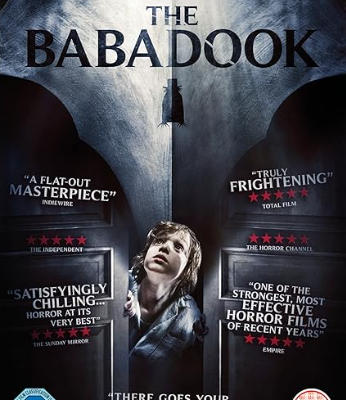Amelia (Essie Davis) is a widow who lost her husband in a heart-breaking stroke of shit luck: he was killed in a car accident while driving to the delivery of their first son. Now six years old, young Sam (Noah Wiseman) has begun to develop behavioral problems and incestuous tendencies, and their neighbors have become increasingly distant as a result. When Amelia discovers a ominously-covered, never-before-seen pop-up book called The Babadook on Sam’s shelf, she decides to immediately debut it as a bedtime story.

**The Babadook** is a psychological horror film that delves into grief, motherhood, and the haunting nature of unresolved trauma. The story centers on Amelia, a widowed mother played by Essie Davis, who is struggling to raise her troubled son, Samuel, in the aftermath of her husband’s tragic death. The film opens with Amelia grappling with her loss and the challenges of single parenthood, as Samuel exhibits increasingly erratic behavior, fueled by his fears of monsters.
One day, Samuel discovers a mysterious storybook titled “Mr. Babadook” in their home. The book tells the tale of a sinister creature that emerges from the darkness and preys on those who acknowledge its existence. As Amelia reads the book to Samuel, she dismisses it as a figment of his imagination. However, the Babadook begins to manifest in their lives, symbolizing Amelia’s unresolved grief and the emotional turmoil she has been suppressing since her husband’s death.
As the haunting escalates, strange occurrences begin to plague the household. Amelia experiences terrifying visions and auditory hallucinations that blur the line between reality and madness. The Babadook’s presence becomes increasingly threatening, revealing itself as a dark manifestation of her pent-up emotions and the stigma surrounding mental health. Samuel’s fears intensify, leading to confrontations between mother and son, as Amelia struggles to maintain her sanity while battling the malevolent force.
The film masterfully employs atmospheric tension, utilizing shadows and sound to create a chilling experience. Director Jennifer Kent crafts a sense of dread that permeates every scene, making the audience question what is real and what is a product of Amelia’s unraveling psyche. The cinematography is stark and claustrophobic, reflecting Amelia’s isolation and despair.
At its core, **The Babadook** is not just a horror film; it’s an exploration of grief, loss, and the challenges of motherhood. Amelia’s journey highlights the importance of facing one’s demons rather than repressing them. The Babadook becomes a metaphor for the darkness that accompanies unresolved pain, emphasizing that true horror often lies within ourselves.
As the film progresses, the climax leads to a poignant and harrowing confrontation between Amelia and the Babadook, forcing her to confront her past and her fears. The ending is open to interpretation, leaving viewers with lingering questions about the nature of grief and how it can shape one’s reality.
**The Babadook** has received critical acclaim for its innovative storytelling and profound themes, establishing itself as a modern classic in the horror genre. Its unique blend of psychological depth and supernatural elements makes it a compelling watch that resonates long after the credits roll, encouraging reflection on the shadows we all carry.



